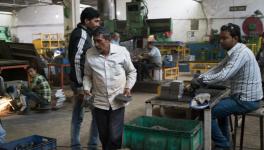Climate Change: 'Durban is Just a Touchstone'
As the United Nations climate change talks in Durban, famously called COP 17, approach, Newsclick speaks with Meena Raman, Third World Network, Malaysia, on where the world stands today and what to expect from Durban summit.
Rough Transcript
Prabir Purkayastha (Prabir): Hello and welcome to Newsclick. Today, we have with us Meena Raman from Third World Network to discuss the climate change negotiations. Meena, good to have you with us.
Meena Raman (Meena): Very happy to be here.
Prabir: The climate change negotiations seems to be completely deadlocked. The way it is looking, the pledges that have been made by the developed countries supposed to have cut significant amounts by 2012 haven't done their job. They are not willing to make further commitments. The commitments they are making so week, there is really no chance of saving the globe really for a 2 degree rise. Where do you think the current negotiations are going?
Meena: Well you have said it. You said it was deadlocked. Unfortunately it is looking very bleak for those of us who were in Cancun and even prior to Cancun if you remember the Copenhagen process where the accord, the 26 Prime Ministers, head of states were convened in the small room. They did not succeed in adopting the Copenhagen accord but unfortunately Cancun appeared to have legitimized the Copenhagen accord. But those of us who have watched that process, we are witnessing a movement of very bleak future in the climate negotiations. When the convention was mooted in 1992 and ratified subsequently and then we have the Kyoto protocol bond. The Kyoto protocol was son or the daughter of the convention and it was supposed to rectify the implementation of the deficit in relation to the mitigation aspect of the climate negotiations because the developed countries were doing very little. So the Kyoto protocol was actually a very key legally binding agreement and that first commitment period which was negotiated which began from 2008 expires in 2012. So, one of the outcomes of Bali is very key is the negotiation of the second commitment period of the Kyoto protocol and if you recall, the first commitment period was only 5% emission reductions by 1990 for Annex 1 countries. Now given the intergovernmental panel of climate change, the findings versus this whole euphoria if you remember, the climate change was the most important phenomenon on and the world had to come together which led to Copenhagen. The mood at that particular time was recognizing that the developed world had to do much much more through legally binding cuts of a kind which would ensure thatdeveloping countries with then have the atmospheric space to undertake the cuts that they need also to ensure that they had the finance and technology but the developed countries did not do what was historically responsible to do then the developing world would not have the chance in terms of sustainable development. So the mood in Bali was that the second commitment period of the Kyoto was so keen. But in Cancun what had happened was nearly a killing of the Kyoto protocol and by all conversations the political agenda was very clear from the developed world. We are not going to stick to Kyoto. We are going to kill this legally binding treaty and replace it with the pledge system where it is not based on science, not based on equity, not based on a top down legally binding setting of emission reduction cuts that have to be done but more like you are a gentleman,I am a gentlewoman, you decide what you wanted to do that is politically feasible, I decide what is politically feasible and then we will do. Then we will pledge and then we will review.
Prabir: So effectively it is coming out let's do what we are willing to do and that if it doesn't save climate just too bad. Seems to be the scenario building up in German. Can we take it the way the Durban is shaping up is really putting the seal on finishing up the Kyoto protocol as it stands unless there is major reversal of what we are seeing.
Meena: Absolutely
Prabir: That would really mean that unless again this pledge and review is stopped or reviewed and changed with the certain period, there is really no really a chance of meeting 2 degree centigrade which is people are talking about.
Meena: This is just for record. Even many of us in civil society is not even happy with the 2 degree work but what we say the safer limit really is 1.5 But even with the pledges on the table, that they are there and the unraveling of the Kyoto protocol and replacing it with this very weak regime and if that political mandate is got in Durban then we are doomed for disaster. So I think what actually has happened since Cancun there seems to be a fight back. The group of developing countries, they negotiate and G77 in China at least in Bonn in June made it very clear that the Kyoto protocol is keen. That for Durban, a second commitment period of the Kyoto protocol is key otherwise there would be no negotiations further. Now, it remains to be seen how strong that unity is and the other question is what the pledges would be because even in the Kyoto protocol the second commitment period, if the pledges are going to be very low, then we are in a hard time.
Prabir: Meena, the other way of looking at is the political scenario and the economic crisis in the West the developed countries is there is no appetite today for doing anything on climate. Also it seems there is a lot of climate skeptics gained in particular United States regarding climate change itself. Do you think that it is politically it is becoming much more difficult to force such climate change negotiations particularly given the mood the developed countries A. B Do you think there is a possibility of aligning the crisis solution to the climate change initiatives like talking of green job, green economy and so on.
Meena: I think it is a question that has to be asked to the civil society around the world. I think in relation to political masters, I think we leave it to the politicians we will not get any where. I think what needs to be felt is the sense of outrage. As we move towards Durban, civil society particularly African Civil Society Movements have been gathering and I think not many of us are hopeful about what will happen in Durban but what we want to do is at least to use that opportunity to expose the politicians particularly the United States. What we have been saying is leave the US out. That if Europe could do the deal with the developing world and the Europeans have constantly put themselves out as a climate champion we never expected that of the United States. But if the European Civil Society allows it's politicians to hide behind United States , then we have trouble in our hand. So for those of us who are in Climate Justice Movement, Durban is another touchstone. I mean it is not the end of the world. This struggle, Climate Justice fight goes on. But I don't think that what we can not let happen for Kyoto to die to have pledged reviewer but we don't need to do is to really up the ante in terms of huge momentum of mobilization. We don't expect anything from the US. But if we can keep the damage of the US, contain the US, we don't expect you to lead. None of them expected to lead. People thought when Obama came, there would be a change. But many of us saw Bush better than Obama simply because you knew you could get help from Bush and therefore, you did expect United States to lead.
Prabir: That is a very interesting proposition that if Europe can detach itself from United States in the climate change negotiations, it's never really happened except for the period when the US was out of the climate change negotiations completely. The issue that Europe today faces is also the kind of austerity measures being forced on them and therefore the crisis of European economy particularly what you seen in Greece, what you see in Spain and what we are likely to see if you are not already seen in Italy. Now unless, we can really couple with the anger of the people and neo liberal economics to the issue of climate. Unless you could bring these two issues together politically it seems to be very difficult to shake. Otherwise it will be really setting them at the cross purposes because people will say we have money for jobs no money now climate. That is I think also a challenge politically for all of us.
Meena: No, well I think those of us who are in this fight don't see the disconnect. I may be see them as a paradigm fight. The climate crisis, the social crisis, the environmental crisis, the economic crisis all as one embedded in a systemic need for change. And that's why many of us say, systemic change not climate change. And so I do think we combated from different angles. So I think this is the moment not just for reform much more than reform transformation in the way we do business. In the way we organise. In the way we produce, in the way we consume. All of which can have positive outcome. So in a sense it presents a lot of opportunity because it has shown that the market is filled you can't rely on the corporate agenda globalisation is really taken us all. This is all a cause. What we see is a response both in terms of environment crisis, social crisis and economic crisis. We see that clearly. So for us, it is not a disconnect. We are talking about consumption and lifestyle. I am coming from Malaysia and I am inspired by Mr. Gandhi. I am not sure how many are.
Prabir: But in a sense that Gandian solution for Europe if you ask people to go back to Gandhian solutions in that sense even I would have some serious reservations on that you are asking people really to de industrialise, de-urbanise. The issue really is that it is important for us to present alternatives which are meaningful both in climate terms and societal terms to really get climate change negotiations in moving.
Meena: No absolutely. I think for those people who are in negotiations see from a very technological fix-it. OK, we can use Geo engineering or we can use this. That's not enough.
Prabir: Geo Engineering is a bit red heading. Obvioulsly, it's a far more dangerous than what it will. And I don't see any serious scientific group is proposing actually Geo engineering. So at the moment, it is just an outlying in all these discussions. But the real issue is that what you have seen is economic crisis having partially derailed the climate movement in the west and unless we really bring these two together the people of the streets fighting the kind of economic recession we are seeing also demanding climate change and may be climate job and unless we do that we are going to really have political jobs convincing the develop countries to come on board.
Meena: OK. That's one of this. The other thing that is helping us unfortunately is the climate itself. I mean you can't ignore the fact that the extreme weather events have taken a toll on all our countries. While you can temporarily forget and say you know we are not feeling the impact that is also exacerbating the crisis. So I do think that this is something that we constantly have to come together and the challenge is phenomenal and I do think that which is huge.
Prabir: That's the other part Northern countries tend to think that the climate warming is good for them and even if it is bad for the rest of the world. But what they forget is extreme weather which unfortunately or fortunately not spared them either. Thank you Meena. I am sure on climate change negotiations we will get back to you as it progresses.
Meena: You are welcome.
Get the latest reports & analysis with people's perspective on Protests, movements & deep analytical videos, discussions of the current affairs in your Telegram app. Subscribe to NewsClick's Telegram channel & get Real-Time updates on stories, as they get published on our website.
























